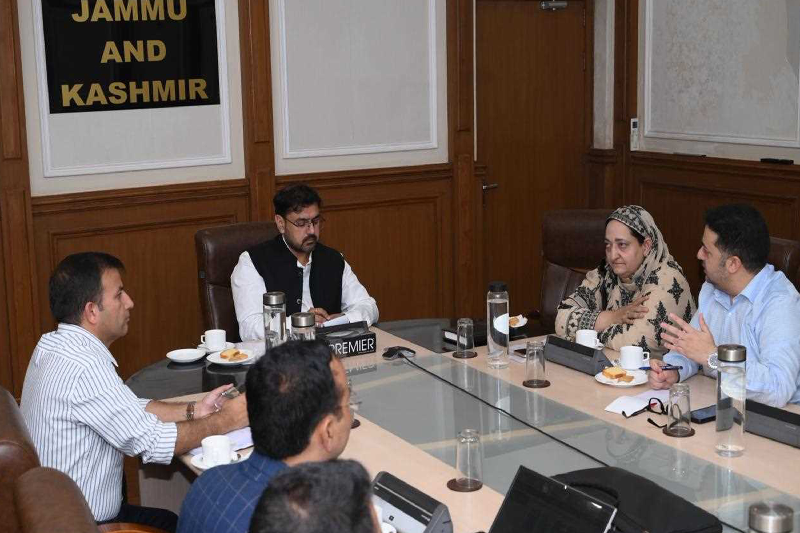
Jammu & Kashmir Government Proposes Single-Window Digital System for Recruitment Reforms
In a landmark move towards administrative modernization, the Jammu and Kashmir government has proposed a Single Window Digital System to streamline recruitment procedures across all departments. The initiative, spearheaded by the Minister of Administrative Reforms, Inspections (ARI) and Training, Satish Sharma, aims to enhance transparency, ensure accountability, and drastically reduce delays in the recruitment process.
At a recent high-level meeting chaired by Minister Sharma, officials discussed the proposal to develop a unified online platform that would replace the existing paper-based and multi-tiered system. The new system is designed to bring together key departments such as ARI & Training, Finance, Law, General Administrative Department (GAD), and the Jammu and Kashmir Public Service Commission (JKPSC) under one digital framework for efficient coordination and timely decision-making.
A Step Towards Streamlined Administration
Minister Sharma emphasized the need to modernize recruitment rules and standardize administrative procedures to align with the government’s commitment to transparent and citizen-centric governance. He highlighted that this reform would not only improve efficiency but also eliminate the bureaucratic bottlenecks that often slow down hiring processes.
“This digital reform will significantly reduce administrative delays, bring transparency, and ensure uniform implementation of recruitment policies across all departments. The Single Window System will not only enhance efficiency but also strengthen accountability through real-time monitoring and public accessibility,” Sharma said.
The minister lauded the ARI & Training Department for conceptualizing the initiative and urged officers to expedite its design and rollout in collaboration with the GAD, Finance, Law, and JKPSC departments. The reform, he said, would mark a transformative step in building a governance model that is transparent, time-bound, and accessible to the public.
Core Features of the Proposed Digital System
The envisioned Single Window Digital System will be equipped with a range of powerful features to ensure seamless coordination and transparency:
- Centralized Online Portal and Dashboard: A one-stop digital platform that integrates all departmental recruitment processes, providing stakeholders with a clear view of the workflow.
- Secure Departmental Logins: Each department will have protected access through secure logins, ensuring accountability and data privacy.
- Standardized Digital Templates: Departments can use uniform digital templates for proposals, simplifying data entry and ensuring consistency.
- Simultaneous Online Routing: Proposals will be routed digitally and simultaneously to key departments such as ARI & Training, Finance, Law, GAD, and JKPSC, ensuring faster approvals.
- Centralized Archive: All approved recruitment rules, amendments, and notifications will be stored in a digital repository for easy access and reference.
- Real-Time Monitoring: The platform will track the progress of each proposal, displaying pendency status and performance indicators in real time.
- Public Reference View: A public-facing interface will allow citizens to view approved recruitment rules and updates, promoting transparency.
- Notification System: Departments will receive real-time updates via SMS or email for approvals, queries, and progress tracking.
- Audit and Data Protection: Built-in audit trails and data security features will safeguard against misuse while maintaining accountability.
- Escalation Mechanisms: Delays in processing will trigger automatic alerts to ensure adherence to defined timelines.
Time-Bound and Transparent Workflow
Under the proposed model, a strict timeline will be implemented to maintain efficiency. Departments initiating recruitment proposals will be required to finalize and submit them within 30 days. Subsequently, each associated department—ARI & Trainings, Finance, Law, GAD, JKPSC, and the Standing Committee—will process the proposal within 10 days each. The General Administrative Department (GAD) will then ensure the final approval within a predefined timeframe.
By creating a time-bound digital workflow, the government aims to eliminate unnecessary delays and standardize recruitment policies across all departments. This approach is expected to ensure that vacancies are filled faster, reducing administrative lag and improving overall governance outcomes.
Integration with Existing Frameworks
To further strengthen its digital governance infrastructure, Minister Sharma directed that the new system be integrated with the existing E-Office framework. This will ensure smooth data flow and consistency between various administrative systems already in place within the Union Territory.
Additionally, Sharma emphasized the need for capacity-building initiatives to train departmental nodal officers and staff members. These workshops will ensure that personnel are equipped to handle the new system efficiently and that the transition from traditional paper-based methods to digital processes occurs seamlessly.
Citizen-Centric Governance and Public Access
A key highlight of the initiative is the focus on citizen-centric governance. The inclusion of a public reference view will allow citizens, job seekers, and stakeholders to access approved recruitment rules online. This move will not only enhance public trust but also align with the government’s broader goal of creating a transparent and accessible administrative system.
The spokesperson further explained that this digital initiative would ensure:
- Uniform recruitment policies across departments.
- Substantial reduction in paperwork and file movement.
- Faster processing and filling of vacant posts.
- Enhanced inter-departmental coordination.
- Improved transparency and accountability.
A Vision for Digital Governance
The Jammu and Kashmir government’s proposal marks a significant step toward digital transformation in public administration. Once implemented, the Single Window Digital System will serve as a model for efficient governance, empowering both departments and citizens with easy access to information and faster service delivery.
Minister Sharma concluded by reiterating that the reform reflects the administration’s vision of a digitally empowered, transparent, and responsive government. “When governance becomes smarter, people’s trust strengthens. This initiative is not just a technical upgrade—it’s a promise of efficiency, transparency, and equal opportunity,” he said.
Conclusion
The Jammu and Kashmir government’s digital recruitment overhaul represents a future-focused approach to governance. By combining technology, accountability, and transparency, the proposed Single Window Digital System is set to redefine how recruitment is managed—turning bureaucratic complexity into efficiency and reinforcing the administration’s commitment to good governance.



